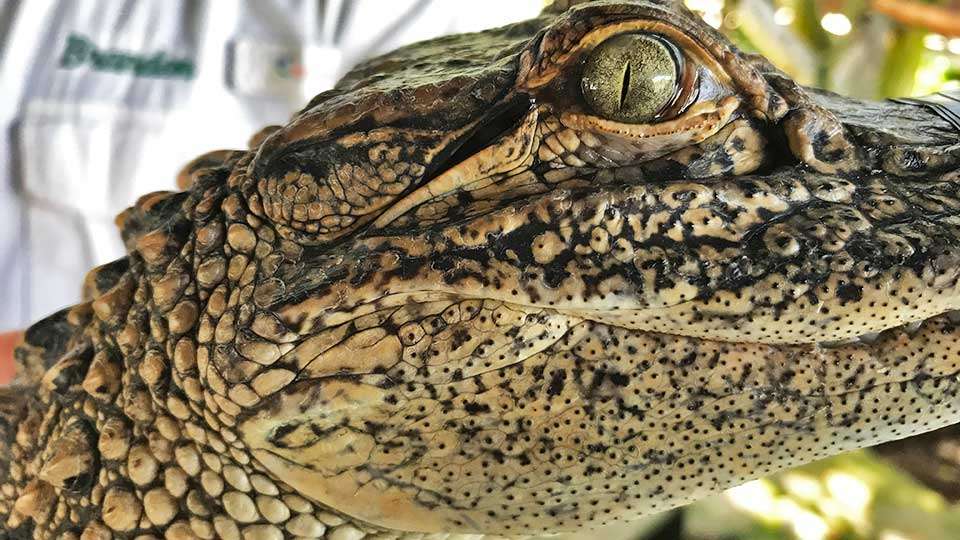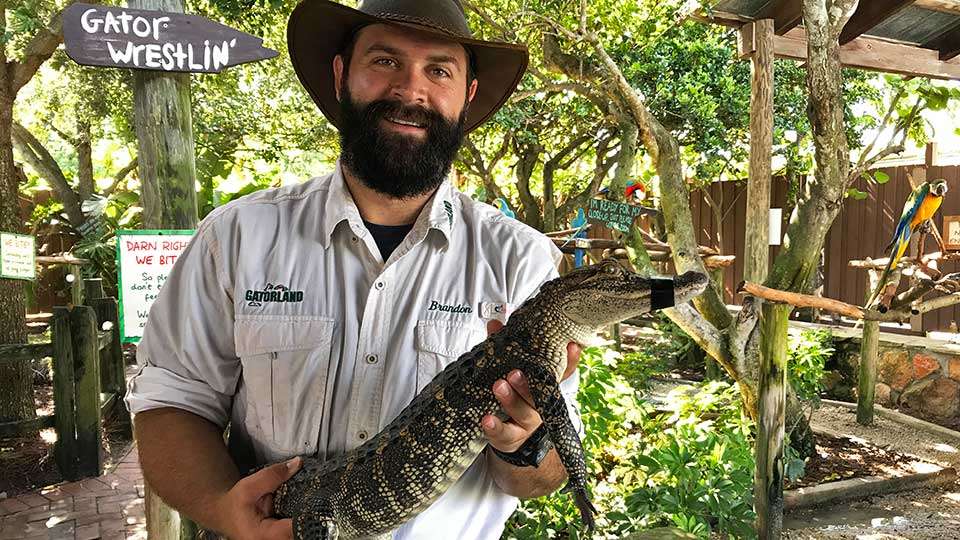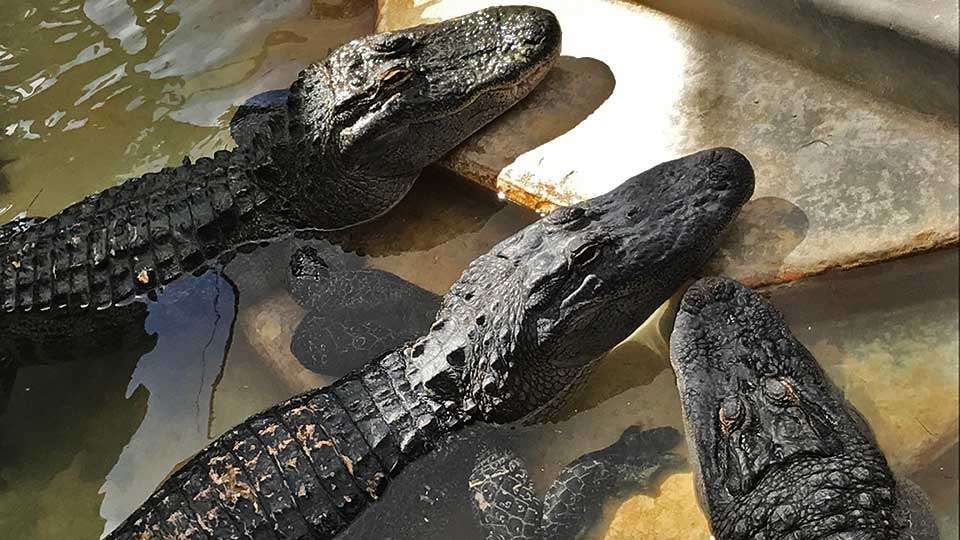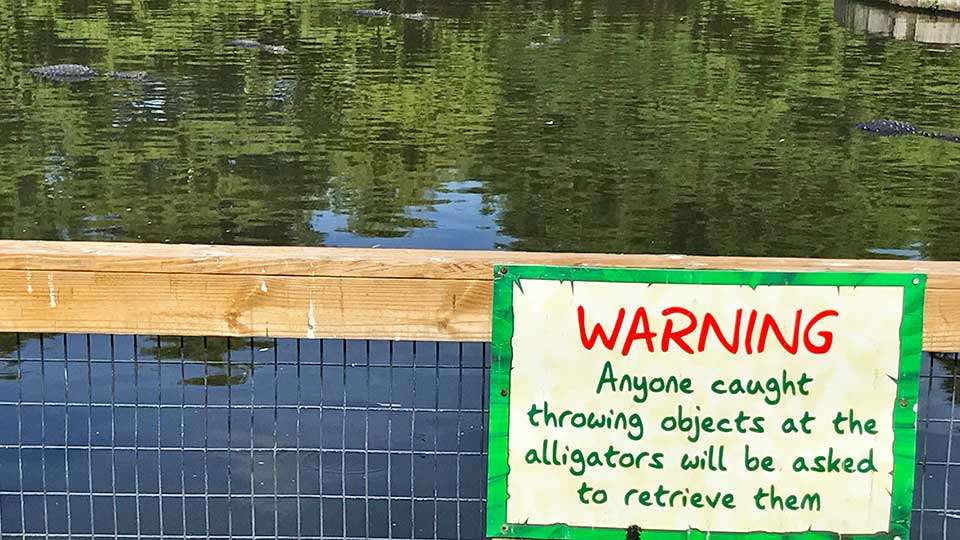
ORLANDO, Fla. – It’s a gator-eat-bass world down in The Sunshine State, but it can also go the other way.
Bassmaster anglers most certainly will encounter a few alligators during the Bass Pro Shops Eastern Open #1 on the Kissimmee Chain of Lakes this week. To learn more about those interactions, we visited Brandon Fisher, director of media production at Gatorland, one of Florida’s original attractions in Orlando.
Fisher, who’s handled all sizes of reptiles at the 110-acre wildlife park for 14 years, said he’s recently gotten into bass fishing after mainly being a saltwater angler. Like most who have fished in Florida, he’s had gators chase his lures, but he offers much more insight on their dietary habits.
“They’re very curious animals, and they’re opportunistic feeders, so if it’s easier for them to catch the food, they’re going to go the easier route,” he said. “A little 2-pound bass somebody catches, they’re going to see that as an easy meal. Anything that splashes or hits the water, they think it is food, and they’re going to go after it.”
Bass anglers are quite accustomed to these gator pursuits, especially when they’re fishing frogs, but other baits are targets too. Fisher said anything swimming nearby a motionless, submerged gator can be in danger, because they have special receptors around their mouths. These little black dots, or integumentary sense organs, can detect changes in salinity or pressure, like a passing fish pushing water.
“They’re basically like whiskers on cat and dog,” Fisher said. “They feel temperature changes and vibrations in water. Anything brushes against that, they’re going to go for it, but it has to be within range.”
Over the years, B.A.S.S. anglers have documented plenty of encounters with gators. Large ones basking in the sun have raced away when a bass boat trolls up too close, while smaller, more aggressive gators have caught up to baits and actually been hooked.

Not naming names, but there’s been images of anglers carefully retrieving lures from the smaller gators’ mouths. Fisher said that’s a no-no.
“If you get caught messing with a wild alligator, you can get into a lot of trouble – a minimum $500 fine and possibly six months in jail,” he said. “By law, you’re not allowed to reel them in. If you catch an alligator, you’re supposed to cut the line and let them go.”
He was pressed about a scenario of leaving a length of line that might end up with the gator wrapping itself onto some immovable object. Fisher said a state wildlife officer might allow some wiggle room for anglers with good intentions, but the workers at Gatorland, who travel the state conducting shows, advise people to leave gators alone.
“These guys have been around for 37 million years. They’ve been around since dinosaurs. Not too much bothers them,” Fisher said. “They’re immune to a lot of diseases. They can literally get part of their foot or tail bitten off in a fight, and within three weeks it’s healed over. They have a lot of healing power in their blood.
“What I’ve been told over the years working with these guys, hooks and things like that aren’t going to bother them too much.”
While rare, gators have caught up to take a hooked bass from an angler. Fisher said that’s just the bad luck of giving one close by the opportunity. He said he’s seen gators catch and eat bass, even though bass are not their desired quarry.
“Gators’ favorite food is turtles,” he said. “It’s their main diet – eat the shell and all. Good source of calcium. Next is birds and fish, but they’re turtle specialists. They’re mostly going to go after turtles.
“Crocodiles, on the other hand, they love fish. That’s their main diet. Crocs are only down in Everglades in salt marshes. That’s the only place in world where gators and crocs co-habitat.”

Gatorland has around 2,000 alligators in the facility, and it’s expanded multiple times since opening in 1949. Fisher said tilapia and gar were stocked in the facility’s lakes and ponds years ago, but the turtles and other fish haven’t needed help sustaining a population, despite the gators.
While bass anglers report that the smaller gators, who repeatedly pursue their baits, are the most annoying, Fisher said gators are at their fastest when they are 6- to 9-feet long.
“Running on land, they go about 7 to 9 miles per hour. Kind of slow, but it’s that first lunge,” he said. “When they’re swimming, it’s 10 to 12 miles an hour, and they last a lot longer swimming than they do running on land.”
Gators can spend hours underwater sitting on the bottom, lying in wait for something to brush alongside their faces, and it certainly includes bass. But the big bass of Florida also exact their toll on the gator population.
“Baby alligators are only six inches long when they hatch out of the eggs and go right in the water, so bass will just gulp them right up. They love it. Big bass will just eat anything,” said Fisher, adding he’s not seen a gator-shaped lure. “Honestly, that could work, but at the same time you might catch a big alligator because bigger ones eat the smaller ones.”
After all, it’s a gator-eat-bass, bass-eat-gator, gator-eat-gator world down in Florida.


